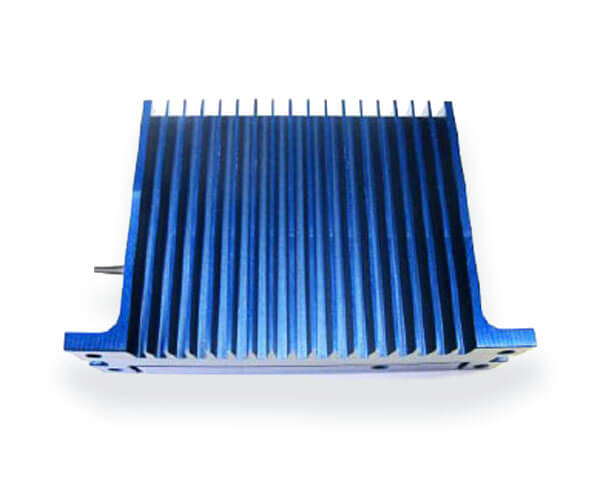SLEDs
Product Portfolio
AMS Technologies supplies a broad portfolio of superluminescent diode (SLED or SLD) solutions, ranging from various SLED modules in TO or Butterfly packages to SLED driver boards all the way to complete benchtop SLED light sources.
A series of standard SLED modules offers a wide variety covering near-infrared (NIR) and RGB (red, green, blue) ranges from 400 nm to 1700 nm, with different output power and bandwidth values. These high-performance SLEDs come in various packages including cooled 14-pin dual-in-line (DIL) and butterfly package, cooled and uncooled 5-pin butterfly packages or low-cost uncooled TOSA and TO-56 packages.
For higher-power applications, a 1310 nm SLD module in a 14-pin NF package is available that features 150 mW minimum output power. This module is optically coupled to a single mode fiber (SMF) pigtail and includes a thermoelectric cooler (TEC), an electrically isolated temperature sensing thermistor and an ST connector.
Our series of high-performance, low-noise, ultra-stable analog RGB and NIR SLED driver boards is optimized for interferometric applications like OCT or fiber sensing. These boards feature a multi-pin connector to which adapter boards can be connected supporting various types of optical modules – for example 14-pin butterfly (BTF), 14-pin dual-in-line (DIL), transmit optical sub-assembly (TOSA) or others.
A complete, highly stable, benchtop SLED light source, designed for OCT, sensor and test applications, features three available operation modes: constant current, constant power (optional), and modulated power. Current and temperature of the SLED are controlled during operation for output power and spectral stabilities.
Related Products
Complementing AMS Technologies’ SLED modules and light sources, our broad portfolio of lasers and light sources encompasses LED chips, components, modules and light sources, broadband, ASE and supercontinuum light sources, but also laser sources like DPSS lasers, diode lasers, gas lasers, OPOs and tunable lasers or other lasers and light sources – and also includes an exceptionally broad portfolio of laser diodes and modules for a wide variety of wavelengths and optical output powers.
For reliably cooling light sources, laser systems and laser components, we carry a very wide thermal management portfolio, ranging from components like thermoelectric, Peltier modules (TECs), heat sinks and fans to TEC- or compressor-based plate to air thermal management assemblies like our mini direct cooling thermoelectric kit to liquid to air thermal management assemblies like recirculating chillers.
Laser safety products available from AMS Technologies include protective eyewear as well as laser safety windows, curtains and cabins.
Our large portfolio of precision optics, manufactured of various optical materials and coated to very specific and demanding tolerances, including disk-shaped optical beamsplitters, optical scanners and deflectors, optical mirrors, windows, filters, lenses, prisms, polarization optics or etalons.
Additionally, we offer a broad range of complementary products such as optical mounts, rotary and translation stages, optical tables, breadboards and platforms as well as a variety of optical test and measurement equipment.
Definition
A variant of the LED (light-emitting diode), superluminescent LEDs or SLEDs provide the usual broadband, quasi-directional and low temporal coherence light emission common to the ubiquitous LED, but with the added benefit of higher optical power and greater spatial coherence. These properties make SLEDs the better option for numerous applications – including telecom, instrumentation, optical coherence tomography (OCT), structural sensors and fiber optic gyroscopes – that require this type of broadband light source.
In terms of its construction, a superluminescent diode (SLED or SLD) is an optoelectronic device similar to a laser diode, but unlike the latter, it does not have a resonator that leads to optical feedback. Such optical resonance is avoided in a SLED by its constructive design and often additionally by applying an anti-reflective (AR) coating.
Like LEDs and laser diodes, a SLED is based on a p/n junction operated in the forward direction and generates light by spontaneous emission. This light is optically amplified (“amplified spontaneous emission”) and emitted by stimulated emission inside the SLED, which acts as a waveguide. As a result, SLEDs offer both the low coherence of a light-emitting diode (i.e. a wider optical bandwidth of the output light) and the brightness of a laser diode.
As with an LED, the emitted average wavelength of a SLED is based on the semiconductor’s band gap and can thus be varied by selecting different semiconducting materials. SLEDs are used as light sources in various applications where high light intensity and spatial coherence are required, but at the same time a broad, uniform wavelength spectrum is needed – which laser diodes cannot offer.
Alternative Terms: SLD; Superluminescent Light-emitting Diode; Superluminescent LED; SLED Module; SLD Module; SLED Driver Board; SLED Light Source





